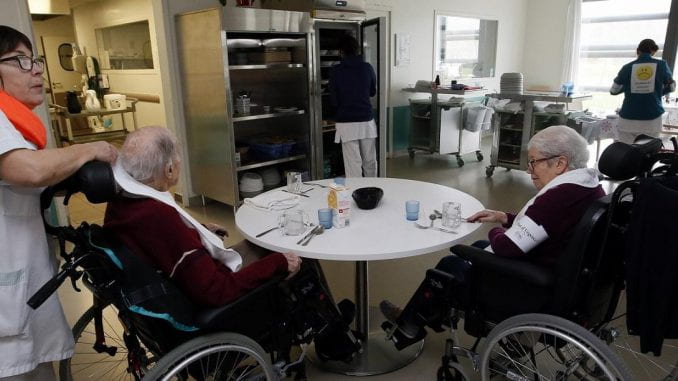Letter from Afar – the blog series about life and research in the time of COVID-19.
By Anders Neergaard.
Dear friends,
Reading newspapers every day and strolling around the streets and parks of Malmö (Sweden) I watch people trying to live with the pandemic. It’s scary as a human being but interesting as a sociologist. It raises so many questions that need further research. Being who I am, I often study a phenomenon or practice in terms of how class, gender and racialisation affect people. Thus, this blog post is about how inequalities intersect with the pandemic health strategies of elderly care, mobility and migration.
In newspapers around the world (such as The Guardian, El País and Página 12) Sweden is making headlines as one of few countries that have not implemented legislated lockdowns of society, instead trying instructions and recommendations for physical distancing (please do not call it social distancing, as we are trying to maintain social closeness in times of physical distance). Is this Swedish approach an experiment, and if so, what will be the consequences compared to other strategies? While these are important questions, we need more time and better material to be able to answer such questions.
Instead, I want to focus on two particular, and partially connected, aspects of what seems to be an Achilles heel in limiting the consequences of the pandemic. One concerns the neo-liberalised care of the elderly in Sweden, and the other the racialised (often of migrants) class structure.
One of the few things we know about COVID-19 is that it aggressively targets the elderly. Thus, the organisation of elderly care is at the core of understanding who dies and why in the pandemic. Most people would argue that care of the elderly is a central aspect of humane societies (despite the fact raised by many economists that their direct contribution to the economy often stops with retirement). Thus, we have some forms of organised elderly care, but it is rarely an area of priority in politics. The elderly care system was far from being good during the heydays of the social democratic welfare state, but the neoliberal re-regulation (using privatisation) (Peck 2004), New Public Management and shrinking municipal taxation (in Sweden the municipalities are formally responsible for care of the elderly) has created a system based on scarcity, just-in-time services and profits (Szebehely 2017). Consequently, elderly care is characterised by employees who have to care for numerous elderly people, elderly people receiving care who have to meet many employees and an austere elderly care infrastructure (Behtoui et al. 2016). In times of the COVID-19 pandemic, this mean that elderly care is a hotbed for the spread of the virus.
Another way of showing the vulnerability of elderly care services is by looking at its care workers (I focus on paid care work, but we shouldn’t forget that a substantial part is carried out by daughters or other female relatives as unpaid work). Within this group, assistant nurses (by far the most prevalent job in elderly care in Sweden) are disproportionately represented by women and racialised workers, both women and men (often migrants) whose role intersects with poor working conditions, low wages and discrimination (Behtoui et al. 2020).
This reflects the gendered and racialised Swedish class structure, meaning that women in general and racialised men and women (many migrants or children to migrants) in particular are overrepresented within the working class, and are overrepresented in working class jobs that have lower wages and poorer working conditions (Neergaard 2018).
What does this have to do with elderly care and the COVID-19 pandemic? In answering, I would like to highlight two key points. In this pandemic two particular categories of jobs with low wages and poor working conditions are important in making the society function but are also highly exposed to COVID-19 and thus to spreading it. The first, mentioned above, are assistant nurses directly involved in caring for the elderly and in containing the virus. The second is the more general category of service workers, especially bus and taxi drivers and ticket inspectors of public transport, but also workers in retail and restaurants. Both these groups work in economically underfunded services, are highly exposed to COVID-19 in their daily work and have been neglected when it comes to protective equipment and instructions for avoiding contagion.
Furthermore, if one of these workers is infected with the virus, then the chance of continued infections is substantial due to their housing situation. In a recent analysis of Statistics Sweden, it was shown that almost one in three immigrants from countries outside Europe, who have been in Sweden for less than ten years, lives in a home with more than two people per bedroom. The corresponding figure for persons born in Sweden, with at least one domestic-born parent, is 2 per cent. Many of these immigrant households are three-generation families that include elderly grandparents due to the difficulties of finding adequate housing among the lower and racially discriminated sections of the working class (SCB 2019).
We don’t yet know when robust statistics will be produced that show Sweden’s excess mortality in the era of COVID-19, although preliminary statistics show a strong overrepresentation of elderly within care, as well as migrant and racialised workers and their parents. However, we shouldn’t focus only on the government’s interventions to contain the pandemic. What I have argued in this short text is that the combination of a neoliberal elderly care regime with a racialised (and gendered) working class structure seems also to be a central factor in explaining why the elderly in care, and the elderly within racialised families, have been more exposed to COVID-19 in Sweden.


